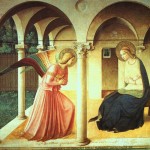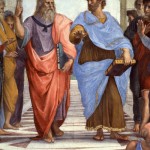Archive for December, 2012
The Half-Empty Glass
I’ve always been a “glass half empty” kind of guy. When life hands me lemonade, I’m disappointed at not having the lemons. My wife sometimes calls me Squidward.
And for our Advent blog, I’m stuck with joy. That’s just great.
Looking at this week’s Gospel reading, it appears that John the Baptist might also have been a “glass half empty” guy.
John said to the crowds that came out to be baptized by him, “You brood of vipers! Who warned you to flee from the wrath to come? Bear fruits worthy of repentance. Do not begin to say to yourselves, ‘We have Abraham as our ancestor’; for I tell you, God is able from these stones to raise up children to Abraham. Even now the ax is lying at the root of the trees; every tree therefore that does not bear good fruit is cut down and thrown into the fire.” And the crowds asked him, “What then should we do?” In reply he said to them, “Whoever has two coats must share with anyone who has none; and whoever has food must do likewise.” Even tax collectors came to be baptized, and they asked him, “Teacher, what should we do?” He said to them, “Collect no more than the amount prescribed for you.” Soldiers also asked him, “And we, what should we do?” He said to them, “Do not extort money from anyone by threats or false accusation, and be satisfied with your wages.” As the people were filled with expectation, and all were questioning in their hearts concerning John, whether he might be the Messiah, John answered all of them by saying, “I baptize you with water; but one who is more powerful than I is coming; I am not worthy to untie the thong of his sandals. He will baptize you with the Holy Spirit and fire. His winnowing fork is in his hand, to clear his threshing floor and to gather the wheat into his granary; but the chaff he will burn with unquenchable fire.” So, with many other exhortations, he proclaimed the good news to the people.
Wrath and unquenchable fire…this is the good news? That’s my kind of guy.
For Zephaniah, the glass was more than half empty. His book of prophecy begins with a bleak and hopeless outlook: “’I will utterly sweep away everything from the face of the earth,’ says the Lord.” And it only gets more bleak as Zephaniah fills in the details.
The great day of the Lord is near, near and hastening fast; the sound of the day of the Lord is bitter, the warrior cries aloud there. That day will be a day of wrath, a day of distress and anguish, a day of ruin and devastation, a day of darkness and gloom, a day of clouds and thick darkness, a day of trumpet blast and battle cry against the fortified cities and against the lofty battlements.
It’s hard to imagine anyone could be joyful on a day like that.
But this week’s reading from Zephaniah 3:14-20 points to another side of the Day of the Lord.
Sing aloud, O daughter Zion; shout, O Israel! Rejoice and exult with all your heart, O daughter Jerusalem! The LORD has taken away the judgments against you, he has turned away your enemies. The king of Israel, the LORD, is in your midst; you shall fear disaster no more. On that day it shall be said to Jerusalem: Do not fear, O Zion; do not let your hands grow weak. The LORD, your God, is in your midst, a warrior who gives victory; he will rejoice over you with gladness, he will renew you in his love; he will exult over you with loud singing as on a day of festival. I will remove disaster from you, so that you will not bear reproach for it. I will deal with all your oppressors at that time. And I will save the lame and gather the outcast, and I will change their shame into praise and renown in all the earth. At that time I will bring you home, at the time when I gather you; for I will make you renowned and praised among all the peoples of the earth, when I restore your fortunes before your eyes, says the LORD.
Needless to say, those days are not here yet. Disasters and oppression have not disappeared. Although Christians believe Jesus is the long-awaited Messiah promised by God, we are in a sense still waiting for him to set things right.
But we can trust that one day God will set things right. We can have confidence not that we are now living in the best of all possible worlds, but that God will eventually overcome all evil and bring healing and wholeness to a world that has been marred by sin since the days of the first humans.
Neither Zephaniah nor John the Baptist were inclined to sugar-coat the message of God’s judgment. But at the same time, they both recognized that the day of judgment would also be a day of joy.
For Christians, joy does not stem from having a positive outlook on life, from looking at everything through rose-colored glasses. The source of our joy is our trust that God will complete the work he set in motion when a baby was born in a barnyard so long ago.
The glass may be half empty now, but one day it will be overflowing.
Peace of Jesus and Mary
The peace of Jesus is the peace of M ary
ary
as a piece of Mary would be the Person she’d carry.
For where would we be without her yes?
Still waiting for God to clean up our mess…
God chose her specific before all the ages
even though He didn’t say so on Biblical pages.
No one can deny that she must have been favored,
but there is some confusion about how hard she labored.
Was it hard for her to say yes to the messenger?
Does a healthy skepticism some how lessen her?
Or was it too simple, if she had no sin?
Was she playing a game in which she had no skin?
These questions and more are the basis for heresies.
But a simpler one came out of the Pharisees.
Who was her Son and why did He care for these,
littlest ones whom He made His inheritees
and how was He different from His parodies
and should we give to each of His charities?
Jesus to Mary was Son, Spouse and Brother
Creator and Redeemer (although undercover)
Mary to Jesus was most truly a mama
but who is better in the thickest drama?
And whose heart could have more love in it
than the one we compare to the ark of the covenant?
For Jesus, to all, is Priest Prophet and King
but Mary’s the quiet voice whom He heard sing.
He gave us sweet Mary for our mother each
so that her peace is not out of our reach.
For although troubles do come into our hearts
she says listen to Jesus and do then your parts.
So as Christmas comes, think a little of Mary,
and a little of Hanna and Sarah who carry
the promise of children that they’d love to have had
and gave them away without appearing sad.
But remember too, the childless and the barren
and this Christmas, let them know that you’re carin’.
The peace of Mary is the Joy that she had
the Joy to the World who makes all nations glad.
Merry Christmas everyone!
A tradition even Evangelicals anticipate
Many Protestants are proud of not having a liturgy, which smacks of tradition, the papacy, and salvation by works. But when it comes to Christmas, we all have traditions. My mother makes the same variety of cookies every year. My father always needs coffee (and us kids made orange juice), read the Christmas story in Luke, and forced us to take turns opening presents on Christmas morning1. We have Advent calendars, tree lightings, gift shopping trips, special meals, and so on that we feel compelled to attend to. For many Christians, Evangelical or not, the December holiday revolves around dozens of revered family, church, and cultural traditions. Most of us wouldn’t have it any other way.
Nearly every church I’ve been to in December celebrates the four weeks of Advent. I bet your church does too. But I wonder how many people know that the Advent tradition is observed by nearly all Christians? Even the Scripture readings are common between Catholics and most Protestants2. There’s something wonderful about the worldwide Church agreeing on something (anything) and our local church, at least, is trying to get on board with that.
If you went to church this week, there’s a really good chance the Old Testament reading was:
“Behold, the days are coming, declares the LORD, when I will fulfill the promise I made to the house of Israel and the house of Judah. In those days and at that time I will cause a righteous Branch to spring up for David, and he shall execute justice and righteousness in the land. In those days Judah will be saved, and Jerusalem will dwell securely. And this is the name by which it will be called: ‘The LORD is our righteousness.’—Jeremiah 33:14-16 (ESV)
As Christians, we believe that this promise was fulfilled by the birth of Jesus, a descendant of David. But when Jeremiah heard this word and spoke it, he was in Jerusalem as it was under siege by the Babylonian king, Nebuchadnezzar II, for the second time. Since after the time of Solomon, David’s son, the Kingdom of Israel had been split into two kingdoms. Then the Northern Kingdom was destroyed by the Assyrians and the Southern Kingdom was defeated by Babylon and a puppet government was established in Judah. God’s promise that a descendant of David would rule a united kingdom forever seemed, at that moment, as far away as could be possible.
In some ways prophets, such as Jeremiah, were ancient editorialists. They commented on the direction of the nation, influenced public opinion, and often disagreed with each other on partisan lines. Near the end of the Kingdom of Judah, there were two camps: those that predicted Babylon would be repulsed and the other that warned that God would allow them to purge the land of idolatry. Jeremiah and Ezekiel were the primary proponents of the later view.
We read Jeremiah’s despair over the destruction of Jerusalem in the book of Lamentations. Nearly his entire career was marked by pessimism over the future of his nation; the Lord required him to prophesy the inevitability of Babylon’s victory. When their armies surrounded the city of David, Jeremiah was imprisoned in palace of Judah on charges of defeatism. God had decided that Israel would be carried into a foreign city because the people would not turn from worshiping other gods. It must have been hard to have hope for the promised peaceful Davidic kingdom.
And yet, he did preach hope. For the next 600 years, Judah waited for the promised messiah. And even now, we wait for His return and the culmination of the promise with expectation and hope. This week of Advent is all about those layers of hope.
How far do you hope? We read in Revelation that God will bring together His Church from every ethnic group who will worship Him forever. As we look around at the brokenness of our culture and the division in our religion, it’s easy to assume that God will need to start over. In a lot of ways, the Protestant Reformation was founded on that assumption. It’s been 2,000 years since Jesus was born, lived, died, and rose again. Is it time to give up on His return?
Who do you put your hope in? Do you expect politics to solve the problems in society? Jeremiah opposed his government, but at the same time affirmed God’s promises that the line of David would one day establish peace. He was impatient with sin, but patient with God to deal with it3. God, unlike anyone else is always good. He always comes through, though not always at the time we expect.
In the coming weeks, we will see how God fulfilled His promise in His Son, Jesus. But we must recall that we are still, in some ways, like the Old Testament prophets: we are waiting with expectation for God’s next move.
Footnotes:
Christmas is Coming!
Brace yourselves, Christmas is coming.
Jokes aside, I’m sure you noticed back in October that your local retailer had lights, trees, ornaments, and the other sure signs that another Christmas season is upon us. While Santa Claus and presents are great, let’s not forget why we celebrate Christmas in the first place.
We here at Eschewmenical would like to take the time this month to celebrate the season of Advent, an Anglicization of the Latin word adventus which means coming. This is the season where churches that observe the liturgical calendar (and others that only incorporate liturgy occasionally) celebrate the four Sundays prior to Christmas with special readings and lighting candles. Each Candle has a special meaning and a reading commonly associated with it.
This month our authors are going to take a break from their normal argumentative style and present the reading and a blog based on the typical theme for Advent.
One of the things we want to be aware of is that A. not all Christian traditions celebrate Advent, and B. that not all Christian traditions observe Christmas. I’d like to extend an invitation to either of these traditions to contribute a blog post this month. I don’t believe we have a current author from either of these traditions but we’d welcome one to come and contribute. Please get in touch with us in our Blog Room to contribute.
Without further ado, I’ll turn the floor over to our authors. This is Eschewmnical!


